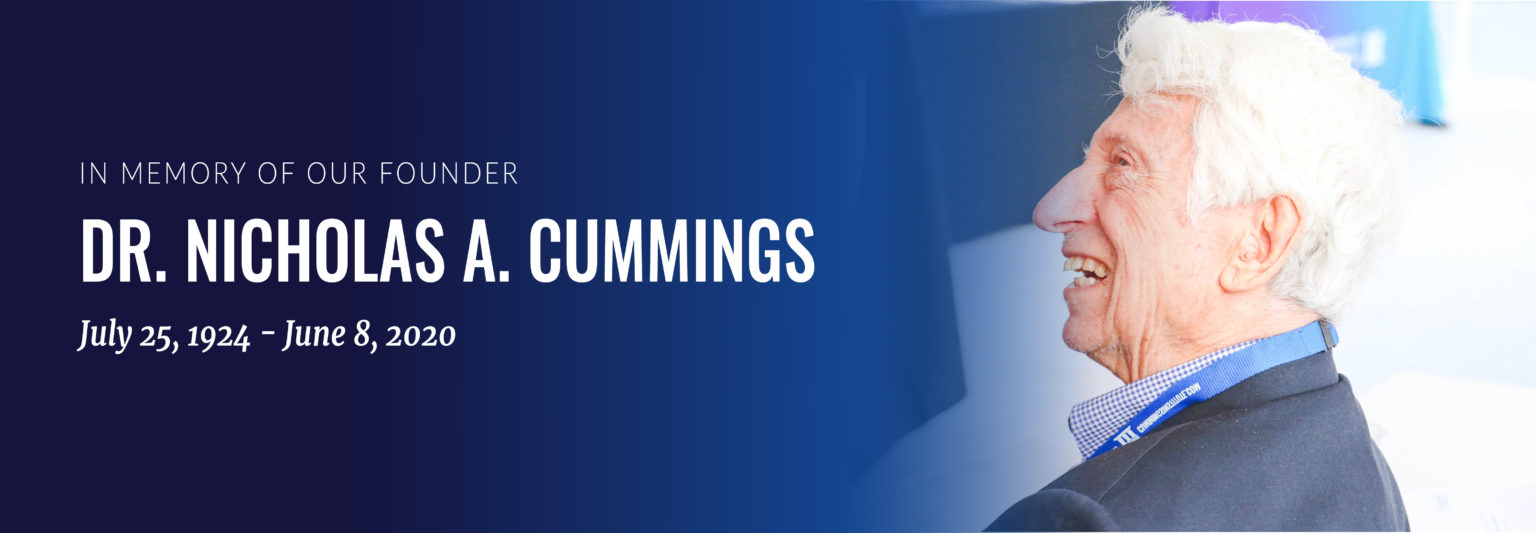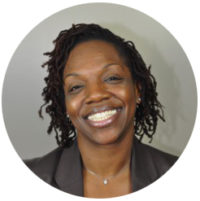
Passing of Dr. Nicholas A. Cummings, Ph.D., Sc.D.,
Founder of Cummings Graduate Institute for Behavioral Health Studies
June 12, 2020
It’s with profound sadness that Cummings Graduate Institute for Behavioral Health Studies announces the passing of our Founder and Board of Directors member, Dr. Nicholas A. Cummings, Ph.D., Sc.D. Dr. Cummings passed away peacefully at the age of 95 on Monday, June 8, 2020, surrounded by his loving family.
Dr. Cummings was deeply loved by his family and friends. It can’t be put into words the loss that will be felt by his passing. In addition to his family, those who had the opportunity to work with him throughout his significant career will also feel a tremendous loss. He was a visionary who, for more than half a century, not only was able to foresee the future of professional psychology and integrated behavioral healthcare, but also helped create it.
A former president of the American Psychological Association (APA) as well as its Divisions 12 (Clinical Psychology) and 29 (Psychotherapy), he formed a number of national organizations in response to trends in the field of psychology. He launched the professional school movement by founding the four campuses of the California School of Professional Psychology that established clinicians as full-fledged members of the faculty. As Chief of Mental Health for the Kaiser Permanente health system in the 1950s, he wrote and implemented the first prepaid psychotherapy contract when psychotherapy was an exclusion rather than a covered benefit in health insurance. In 1994, he and his wife, Dorothy, co-founded the Nicholas & Dorothy Cummings Foundation. The Foundation is dedicated to ensuring that routine healthcare includes integrated behavioral health.
Dr. Cummings realized that healthcare needed a revolution and saw an opportunity to teach behavioral health providers to disrupt the ineffective, fragmented healthcare system from within. No university existed that was out-of-the-box enough to create both the curriculum and the environment that would stimulate the kind of innovation that healthcare needed, so he filled the need. In 2014, Dr. Cummings along with his daughter, Dr. Janet L. Cummings, Psy.D, created the Cummings Graduate Institute for Behavioral Health Studies to fill the educational gaps for innovative and entrepreneurial healthcare professionals wishing to disrupt healthcare from within or launch new ventures.
Dr. Cara English, CEO of Cummings Graduate Institute shared the following:
“It’s hard to put into words how much working with and for Dr. Nick meant to me as a DBH. He lived an incredible life and gave us so much of his passion for designing the kind of health care we all deserve. Being able to help the Cummings family bring CGI to life has been a rare gift in that I got to know Dr. Nick both personally and professionally. I have been able to see the love and devotion he had for his family, as well as the tenacity and integrity he had as a thought leader in our field.
“Dr. Nick gave many of his students a model to use when faced with difficult challenges, and I hope that “What would Nick do?” is a thought that his students can use for inspiration and humor as needed when the going gets tough. He was not afraid to be controversial when he knew that a system had to be changed, and we carry on his legacy. We must continue to make him proud with our accomplishments.”
Cummings Graduate Institute for Behavioral Health Studies will continue to serve as the legacy of his career, research, and clinical practice. Supporting the work of Doctors of Behavioral Health at Cummings Graduate Institute was Dr. Nicholas Cummings’ focus and passion over the past five years. In lieu of flowers, the Cummings family encourages memorial contributions to be made to Cummings Graduate Institute for Behavioral Health Studies, 100% of which will go directly to DBH student scholarships. Donations may be made here.
As we say in Greek, “Μνήμη αιώνια” (“May his memory be eternal”).
- Dr. Nicholas. A. Cummings, 2020
- Dr. Nicholas. A. Cummings with wife, Dorothy Cummings at the DBH Commencement Ceremony 2020
- Dr. Nicholas. A. Cummings with wife, Dorothy Cummings and daughter, Dr. Janet Cummings at the DBH Commencement Ceremony 2020
- Dr. Nicholas. A. Cummings with wife, Dorothy Cummings, daughter, Dr. Janet Cummings and DBH Graduate, Dr. Liliane de Aguiar-Rocha at the DBH Commencement Ceremony 2020
- Dr. Nicholas. A. Cummings with wife, Dorothy Cummings, daughter, Dr. Janet Cummings and Brett Sabatini at the DBH Commencement Ceremony 2020
- Dr. Nicholas. A. Cummings and Dr. Cara English at the DBH Commencement Ceremony 2020
- Dr. Nicholas. A. Cummings and Dorothy Cummings at the DBH Commencement Ceremony 2020
- Dr. Nicholas. A. Cummings and Dr. Larry Ford at the DBH Commencement Ceremony 2020
- Dr. Nicholas. A. Cummings, 2018
- Dr. Nicholas. A. Cummings with wife, Dorothy Cummings. daughter, Dr. Janet Cummings and CGI Faculty at the DBH Commencement Ceremony 2018
- Dr. Nicholas. A. Cummings with Dorothy Cummings, Dr. Cara English, and Amanda Harrison at the Cummings PSYCHE Award Presentation 2018
- Dr. Nicholas. A. Cummings with Dorothy Cummings, Dr. Cara Engish, Dr. Leolani AhQuin and Dr. Glorinda Segay at the Cummings Biodyne Mindset Awards Presentation 2018
- Dr. Nicholas. A. Cummings presenting at the Cummings Biodyne Mindset and Cummings PSYCHE Awards Presentation 2018
- Dr. Nicholas. A. Cummings and Dr. Glorinda Segay at the the Integrated Care Conference 2018
- Dr. Nicholas. A. Cummings at the the Integrated Care Conference 2018Commencement Ceremony 2018
- Dr. Nicholas. A. Cummings at the the Integrated Care Conference 2018
- Dr. Nicholas. A. Cummings and DBH Graudate, Dr. Leolani Ah Quin at the the DBH Commencement Ceremony 2015
- Dr. Nicholas. A. Cummings and DBH Graduate, Dr. Stephen Lee at the the DBH Commencement Ceremony 2015
- Dr. Nicholas. A. Cummings with wife, Dorothy Cummings, daughter, Dr. Janet Cummings and Brett Sabatini at the DBH Commencement Ceremony 2015
- Dr. Nicholas. A. Cummings with DBH Graduates at the the DBH Commencement Ceremony 2015
Remembrance Messages from the CGI Community
Everyone at Cummings Graduate Institute for Behavioral Health Studies pass on their sincere condolences to the Cummings family. Below are messages from members of the CGI community.
 “Almost a decade ago, I bought a book, Refocused Psychotherapy, which completely changed my practice and subsequently, my life. When CGI was about to open, there was no question of which path I was going to follow. I am grateful that I was one of the initial graduates from CGI.
“Almost a decade ago, I bought a book, Refocused Psychotherapy, which completely changed my practice and subsequently, my life. When CGI was about to open, there was no question of which path I was going to follow. I am grateful that I was one of the initial graduates from CGI.
One of my fondest memories was having an opportunity to speak one on one with Nick by an outdoor fire at the hotel we stayed at. What a wonderful time: He was telling me stories of Frieda Fromm-Reichmann, Milton Erickson, and all the “greats.” It truly is one of my greatest memories.
I’m so fortunate to have had the privilege of meeting him, and I will continue to honor him by staying true to the principles of the Biodyne model and everything he bequeathed us.“
- Dr. Stephen Lee, DBH, Alumni of Cummings Graduate Institute for Behavioral Health Studies, June 8, 2020

“Dr. Nick inspired us all in so many ways and gave us some necessary tools to be successful. My thoughts and prayers are with you all.”
- Dr. Fanike-Kiara Olugbala Young, DBH, LCSW, Assistant Director of the DBH Program and Cummings Graduate Institute for Behavioral Health Studies, June 8, 2020

“I’m extremely saddened to hear of Dr. Nick’s passing, and while I take heart that a piece of him continues on in all of us, the world has lost a legend in the healthcare field.”
- Dr. Wendy Boring-Bray, DBH, LPCC, Faculty at Cummings Graduate Institute for Behavioral Health Studies, June 8, 2020


















































